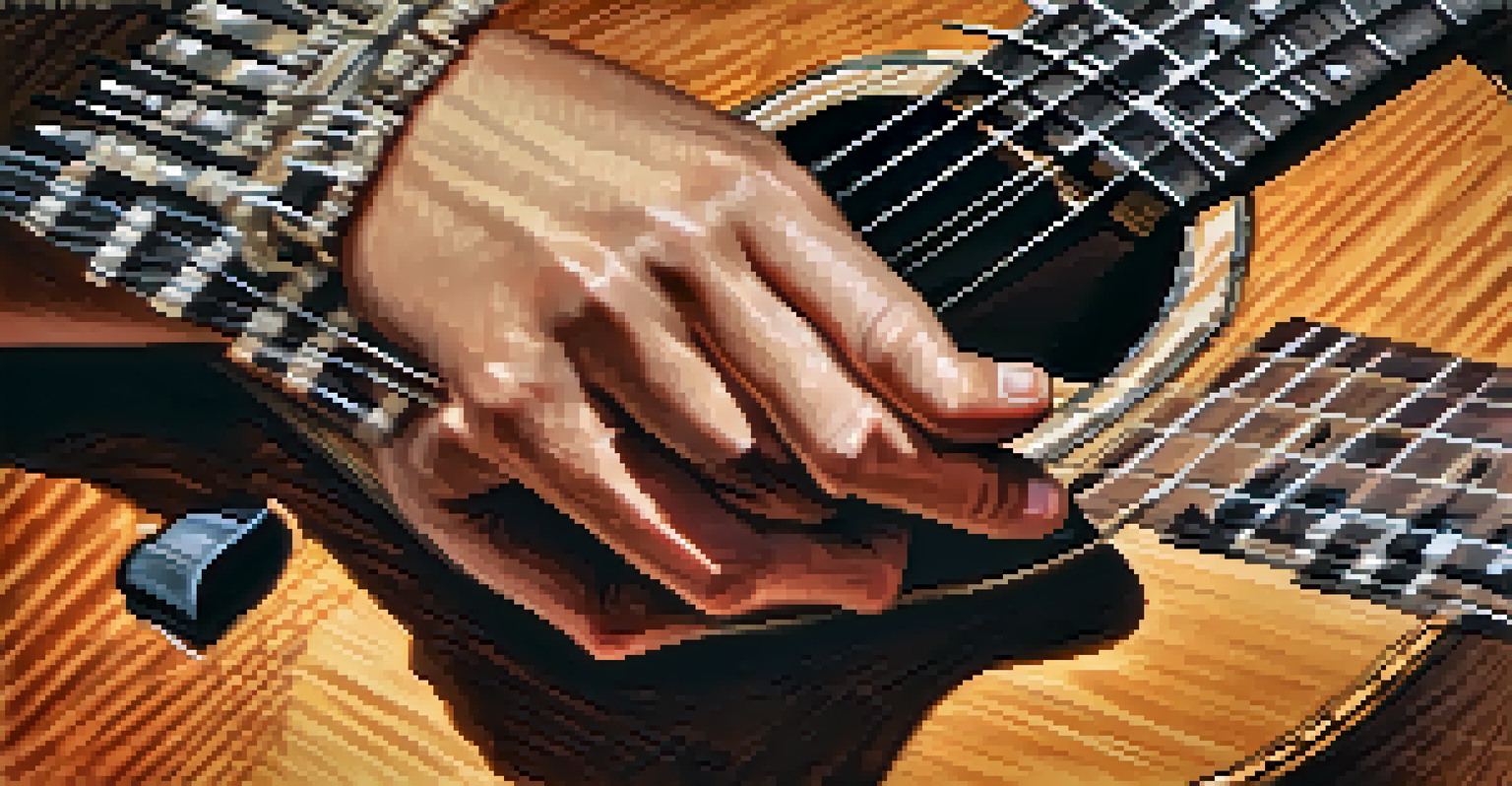Ukulele as a Tool for Engaging Students in Music Programs

The Ukulele: A Beginner-Friendly Instrument for All Ages
The ukulele is often celebrated for its approachable size and light weight, making it perfect for students of all ages. Unlike larger instruments, the ukulele's short neck and simple chord structures allow beginners to start playing quickly. This accessibility encourages students to pick it up, fostering a sense of accomplishment and motivation.
Music can change the world because it can change people.
Moreover, its cheerful sound resonates with many, creating an enjoyable learning atmosphere. When students hear music they love coming from their own hands, it ignites a passion for music that can last a lifetime. This immediate gratification is crucial in maintaining interest, especially for younger learners.
Additionally, the ukulele fits seamlessly into various musical genres, from pop to traditional Hawaiian. This versatility not only keeps lessons fresh and exciting but also allows students to explore different styles, broadening their musical horizons.
Building Community Through Group Learning
One of the best aspects of learning the ukulele is its suitability for group settings. Students can easily play together, whether in a classroom or a community band, fostering teamwork and collaboration. This shared experience can help build friendships, creating a supportive environment that encourages participation.

Group ukulele lessons can also promote peer learning, where students teach and motivate each other. This collaborative spirit helps cultivate a sense of belonging, as students celebrate each other’s progress and achievements. In turn, this camaraderie can lead to a more engaged and enthusiastic class atmosphere.
Ukulele: Accessible for All Ages
The ukulele's size and simple chord structures make it an ideal instrument for beginners of all ages, fostering a quick sense of accomplishment.
Moreover, participating in group performances cultivates confidence and public speaking skills. Students can showcase their talents in front of an audience, providing a platform to share their love for music while developing essential life skills.
Enhancing Cognitive Skills Through Music Education
Engaging with the ukulele can lead to numerous cognitive benefits for students. Learning an instrument improves memory, attention, and critical thinking skills, all of which are key components of academic success. As students practice chords and songs, they exercise their brains in ways that enhance their overall learning capabilities.
The beautiful thing about learning is that no one can take it away from you.
Additionally, the act of playing music fosters creativity, allowing students to express themselves in unique ways. Whether through songwriting or improvisation, the ukulele provides an outlet for individual expression. This creative process not only boosts self-esteem but also encourages innovative thinking.
Research has shown that music education can improve performance in subjects like math and reading. By integrating the ukulele into music programs, educators can help students develop these essential skills while simultaneously nurturing their love for music.
Fostering Emotional Well-Being with Music
Playing the ukulele is not just about making music—it's also a powerful tool for emotional expression. For many students, music serves as a safe outlet for their feelings, helping them navigate the ups and downs of life. Strumming away on a ukulele can be incredibly cathartic, providing relief in times of stress or anxiety.
Moreover, music has been shown to boost mood and promote relaxation. The simple act of playing uplifting tunes can turn a bad day into a better one, helping students cope with emotional challenges. By incorporating the ukulele into music programs, educators can offer students a means to explore their emotions in a healthy way.
Community and Collaboration in Music
Group ukulele lessons promote teamwork and camaraderie, enhancing the learning experience through shared musical experiences.
Creating a joyful and supportive environment through music encourages students to express themselves openly. This emotional safety can lead to deeper connections among peers and foster a culture of understanding and empathy within the classroom.
Motivating Students with Fun and Engaging Lessons
The key to keeping students engaged in music programs is to make learning enjoyable. The ukulele, with its lighthearted sound and playful nature, naturally lends itself to fun and interactive lessons. Incorporating games, challenges, and popular songs into ukulele classes can spark excitement and enthusiasm among students.
For instance, using familiar songs that students love can motivate them to practice and improve their skills. By allowing students to play music they connect with, educators can create a sense of ownership over their learning experience. This sense of agency can be incredibly empowering.
Additionally, incorporating technology, such as apps and online tutorials, can enhance the learning experience. Students can track their progress, learn at their own pace, and connect with a broader community of ukulele enthusiasts, all while having fun.
Incorporating Culture and Diversity Through Music
The ukulele has roots in Hawaiian culture, but its influence stretches across various musical traditions worldwide. By incorporating diverse musical styles and cultural contexts into lessons, educators can broaden students' appreciation for global music. This exploration fosters curiosity and respect for different cultures.
Learning songs from different backgrounds can also help students understand the stories and histories behind the music. This context enriches their overall musical experience and cultivates a sense of connection to the world around them. It highlights the power of music as a universal language.
Music Education Boosts Cognitive Skills
Learning the ukulele not only enhances musical abilities but also improves memory, attention, and creativity, benefiting overall academic performance.
Moreover, celebrating cultural diversity through music can promote inclusivity in the classroom. Students from different backgrounds can share their musical heritage, creating a rich tapestry of sounds and experiences that enhances everyone's learning journey.
Encouraging Lifelong Learning and Passion for Music
Introducing the ukulele in music programs can ignite a lifelong passion for music. As students develop their skills and explore various musical genres, they may wish to continue their musical journey beyond the classroom. This foundational experience can lead to further interest in other instruments or musical pursuits.
Moreover, the portable nature of the ukulele makes it easy for students to continue practicing at home or even take it on the go. This accessibility encourages them to play whenever they feel inspired, reinforcing their love for music and enhancing their skills over time.

As students grow and evolve, the ukulele can remain a constant companion in their lives—whether for personal enjoyment or as part of future musical endeavors. This lasting connection to music is invaluable, fostering creativity and joy throughout their lives.